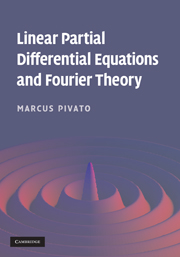Book contents
- Frontmatter
- Contents
- Preface
- What's good about this book?
- Suggested 12-week syllabus
- Part I Motivating examples and major applications
- Part II General theory
- Part III Fourier series on bounded domains
- Part IV BVP solutions via eigenfunction expansions
- Part V Miscellaneous solution methods
- Part VI Fourier transforms on unbounded domains
- Appendix A Sets and functions
- Appendix B Derivatives – notation
- Appendix C Complex numbers
- Appendix D Coordinate systems and domains
- Appendix E Vector calculus
- Appendix F Differentiation of function series
- Appendix G Differentiation of integrals
- Appendix H Taylor polynomials
- References
- Subject index
- Notation index
Part III - Fourier series on bounded domains
Published online by Cambridge University Press: 05 June 2012
- Frontmatter
- Contents
- Preface
- What's good about this book?
- Suggested 12-week syllabus
- Part I Motivating examples and major applications
- Part II General theory
- Part III Fourier series on bounded domains
- Part IV BVP solutions via eigenfunction expansions
- Part V Miscellaneous solution methods
- Part VI Fourier transforms on unbounded domains
- Appendix A Sets and functions
- Appendix B Derivatives – notation
- Appendix C Complex numbers
- Appendix D Coordinate systems and domains
- Appendix E Vector calculus
- Appendix F Differentiation of function series
- Appendix G Differentiation of integrals
- Appendix H Taylor polynomials
- References
- Subject index
- Notation index
Summary
Any complex sound is a combination of simple ‘pure tones’ of different frequencies. For example, a musical chord is a superposition of three (or more) musical notes, each with a different frequency. In fact, a musical note itself is not really a single frequency at all; a note consists of a ‘fundamental’ frequency, plus a cascade of higher-frequency ‘harmonics’. The energy distribution of these harmonics is part of what gives each musical instrument its distinctive sound. The decomposition of a sound into separate frequencies is sometimes called its power spectrum. A crude graphical representation of this power spectrum is visible on most modern stereo systems (the little jiggling red bars).
Fourier theory is based on the idea that a real-valued function is like a sound, which can be represented as a superposition of ‘pure tones’ (i.e. sine waves and/or cosine waves) of distinct frequencies. This provides a ‘coordinate system’ for expressing functions, and within this coordinate system we can express the solutions for many partial differential equations in a simple and elegant way. Fourier theory is also an essential tool in probability theory and signal analysis (although we will not discuss these applications in this book).
The idea of Fourier theory is simple, but to make this idea rigorous enough to be useful, we must deploy some formidable mathematical machinery. So we will begin by developing the necessary background concerning inner products, orthogonality, and the convergence of functions.
- Type
- Chapter
- Information
- Linear Partial Differential Equations and Fourier Theory , pp. 105 - 106Publisher: Cambridge University PressPrint publication year: 2010



